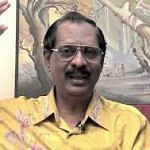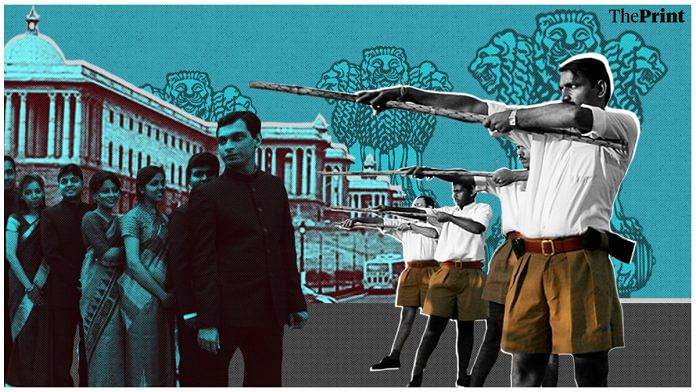RSS-linked body Shiksha Sanskriti Utthan Nyas has appealed to the Narendra Modi government to alter the UPSC selection process and make it accessible to all. It claims 90 per cent of those who qualified were from an English-speaking background. The body has recommended scrapping the aptitude test and setting question papers in Hindi.
ThePrint asks: Are RSS-linked groups right in criticising UPSC selection process for favouring Indian elite?
If RSS & linked bodies’ recommendations are going to determine future of IAS, then god help this country
 TR Raghunandan
TR Raghunandan
Former IAS officer and Director, Avantika Foundation
I don’t think the current UPSC selection process in any way favours the Indian elite because the entire examination system has been modified a great deal over the years to make it more egalitarian. There was an overt elitist bias during the time of the British. In fact, my father topped the UPSC examination but was not allowed to join the services because he came from an ‘untouchable’ community and was the son of a farmer. But that practice has changed today.
In 1979, the Kothari Commission report on the UPSC entrance examination suggested many changes, which were later adopted. It made the selection process more egalitarian and mandated that all applicants need to clear one Indian language paper of their choice. Around that time, the option of writing the UPSC exams in other languages was also offered and, therefore, applicants started writing the papers in Hindi and Kannada.
Then the Mandal Commission recommendations brought about a massive change in the composition of the IAS and even expanded the diversity of candidates from within the backward communities entering the services. I also think it is important to understand that elitism is not just premised on the background of people because many who belong to the economically-disadvantaged class accept fat dowries and become corrupt — and essentially start imbibing what they resisted. Getting into civil services should not go to your head because this also creates a brand of elitism.
The RSS should not be the organisation talking about egalitarianism as it only furthers the interest of one community. And if its recommendations are going to determine the future of the IAS, then god help this country.
Also read: To help Hindi UPSC aspirants, RSS wants to scrap aptitude test & change interview system
Ultimate aim should be to make Indian civil servants realise they are here not to ‘rule’ but to ‘serve’
 Arun Anand
Arun Anand
CEO, Indraprastha Vishwa Samvad Kendra, and author of The Saffron Surge: Untold Story of RSS
Changing the UPSC exam pattern is necessary but not sufficient. This is not the first time that a demand to change the elitist pattern of the UPSC selection process has come up. The issue needs to be debated and discussed at all levels.
But attributing this demand to RSS-linked groups and making it appear as if it is the RSS that is endorsing this agenda is incorrect. The present social structure in India suffers from a colonial hangover.
The civil services were meant to be elitist when the Britishers had created an ‘iron framework’ to rule India. But we failed to change this framework after Independence. In fact, over the years, the UPSC has become the ‘most’ elite service in the country because the members of this service want to keep it this way.
To do away with ‘elitism’, the first step is to change the UPSC examination pattern so that people from non-elitist background too can join the civil services.
But that alone would not be sufficient because people want to join the civil services to become a part of an ‘elite’ club.
The ultimate aim should be to make Indian civil servants realise that they are here not to ‘rule’ but to ‘serve’. The current UPSC selection structure needs to be dismantled and a new system should be put in place.
Also read: Common foundation course for IAS, IPS officers begins, Modi to address them at Patel statue
UPSC exam favours people with STEM background, and there is nothing wrong in this
 AP Singh
AP Singh
Former UPSC member
There was some criticism regarding the translation of the UPSC entrance exams from English to regional languages because the meaning of questions was getting lost in Google translation. Mechanical translations don’t work and you need someone who can actually understand the question and then meaningfully translate it.
I don’t think there is a bias in the selection process. Most UPSC exam applicants come from IITs and medical colleges; there are hardly any aspirants from liberal arts colleges. Since the candidates are already doctors or engineers, they are in a way pre-selected because they have been through the grind earlier. In fact, the exam now favours people with STEM background, and there is nothing wrong in this.
The interviews for selection are uniform in nature. The interviewers tend to become judgmental only when they assess how well one speaks or dresses. But these interviews give you a sense of a person’s knowledge, extra-curricular interests and communication skills.
The Civil Services Aptitude Test essentially weeds out non-serious aspirants. Since a large number of people apply for civil services exams, UPSC faces logistic issues.
Candidates from mostly elite background clearing UPSC shows why the selection process must change
 Sangit Ragi
Sangit Ragi
Political Analyst and Professor at Delhi university
Demands for changes in the UPSC selection process for the IAS, IFS and allied services have always been raised. The UPSC’s response to such demands hasn’t been comp
rehensive. The goal and range of the activities of modern techno-centric and developmental State like ours have changed but the bureaucracy continues to cling to an old-style working culture and appropriated power arrogance. The required changes that we want in the mindset of the Indian bureaucracy are not visible. Therefore, people have been demanding a comprehensive change in the civil services exams’ selection process.
The UPSC has failed to make reasonable arguments in favour of testing the intellectual grasp of candidates in courses of their choice. This meant that we did not get the kind of people we want in the Indian administration. Similarly, the interview process has seemingly favoured vocal candidates and those who come from elite educational and social backgrounds. This is evident from the educational and social profile of the selected candidates.
So, the demand for replacing the Civil Services Aptitude Test with a psychological test is logical and reasonable. It does not matter who is placing these demands. The important point is to look at the demand and figure out to what extent it is reasonable. Setting up separate cadres of generalists and specialists in consonance with the nature of requirements in the government is far more needed today given the new challenges the country’s bureaucracy has to handle.
Also read: UPSC question paper gets ‘lost in translation’, RSS-backed body wants it drafted in Hindi
UPSC coaching is a booming industry and costs a lot – which means only upper class can afford it
 Christodas Gandhi
Christodas Gandhi
Former additional chief secretary
The RSS is not a reliable organisation to decide for this country. It cannot say anything right and should have been disbanded long ago. If I now react to the RSS, it will be tantamount to acknowledging it, which I don’t want to do.
That being said, instead of critiquing the UPSC selection process, we should be looking for alternatives. The purpose is to draw candidates from all states. The selection process and the selection criteria should be left to respective states.
The language for the exam can’t be in Tamil, Hindi or Sanskrit because the UPSC is a federated body. There certainly can’t be an equitable system or a one-size-fits-all approach for each state in the country because of our diversity.
Since this is an all-India exam, all kinds of coaching centres have mushroomed, resulting in a boomingcoaching business. People are paying Rs 1 lakh a year for UPSC exam preparation, which only the upper class can afford. The UPSC is paving the way for the selection of elites.
I will even go to the extent of recommending that the UPSC and all kinds of central selectors be scrapped. The socio-political environment in India is changing, and it looks like institutions are being enabled to hire people only of their own choice.
By Taran Deol and Revathi Krishnan




excellent
Who gives a sh*t? Learn ot make Pakoda.
There is a mistake in my comments. My father was not a UPSC topper, as reported. He wrote the ICS entrance exam before independence and topped the law paper. He was called for the interview to Delhi and was clearly told that he would not make the grade because he did not have the right family background, being the son of an illiterate farmer and a barely literate mother. And yes, he suffered from untouchability too.
Raghunandan
Britishers had left India in 1947 but their mind set continues to rule India through the system that produces English slaves in India.
Change it in such a way that coaching type of system ends because most of the people who clear the exams are who get the taste of coaching institutes and it’s the rich class who get into coaching with the money power.
RSS ka kya matlab hai bhai upsc mein bolna ka …medium hai upsc k papers dene ke liye if one is not good at english thn she/he cam give it in hindi…and agar jr paper candidates k hisaab se change hone lga to jo gya kaam…UPSC is separate organisation and RSS has no right to say upsc to change the pattern of upsc…AND DESERVE BEFORE DESIRE…aapki zindagi ki mushkile aapke hisaab se chng ni ho jaati aapko chng hona hota hai to upsc ke liye khud chng ho naki upsc ko khud k liye chng kro….
If SSUN is raising serious points, intended to broad base the selection away from elites, that should receive due consideration. A lot of candidates from modest backgrounds succeed each year. 2. English is no longer a make or break issue for the civil service, although it is difficult to think of a mandarin going through various stages of her career without having proficiency in the language. 3. An excessive focus on STEM is not desirable. People with liberal education need to be selected in larger numbers, today more than ever before. Dil aur dimaag dono chahiyein …